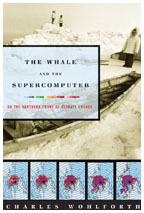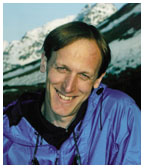May 12, 2004: Reading Room
Charles Wohlforth ’86 examines how Eskimos and scientists view knowledge and nature. (Photo: Erik Hill) |
Winter’s
bust
Charles Wohlforth ’86 looks at climate change in the
Arctic
Climate change has hit home for Charles Wohlforth ’86. Warmer and shorter winters in his native Alaska have meant less skiing and ice skating, and dreary days with little snow on the ground to brighten things up. The warmer temperatures have encouraged the spread of spruce-bark beetles, which have killed millions of acres of trees, making parts of the state look “like a war zone,” says Wohlforth, who lives in Anchorage.
In his new book, The Whale and the Supercomputer: On the Northern Front of Climate Change, published by North Point Press in April, Wohlforth, a journalist who covered the Exxon Valdez oil spill for the Anchorage Daily News, looks at Barrow’s whaling communities, among the Alaskan communities hardest hit by climate change as warmer weather endangers their subsistence lifestyle. He weaves their stories with those of scientists who have flocked to the North Slope to conduct cutting-edge research on sea ice, snowfall, tundra ecology, permafrost, and atmospheric carbon dioxide.
 Global
warming, which is happening first and most dramatically in the Arctic
as snow and ice diminish and the Earth absorbs more solar radiation, has
made whaling, a mainstay of Barrow’s Inupiaq Eskimos, more dangerous.
Thinner ice makes hauling a kill out of the sea more difficult, and increases
the likeliood of ice breaks, which can leave whalers and their equipment
stranded on pieces of floating ice. Bigger waves forming near shore have
forced whalers to trade in their small boats for bigger ones. And as coastal
erosion has accelerated, Barrow villagers must decide between building
a sea wall and moving vulnerable buildings away from shore.
Global
warming, which is happening first and most dramatically in the Arctic
as snow and ice diminish and the Earth absorbs more solar radiation, has
made whaling, a mainstay of Barrow’s Inupiaq Eskimos, more dangerous.
Thinner ice makes hauling a kill out of the sea more difficult, and increases
the likeliood of ice breaks, which can leave whalers and their equipment
stranded on pieces of floating ice. Bigger waves forming near shore have
forced whalers to trade in their small boats for bigger ones. And as coastal
erosion has accelerated, Barrow villagers must decide between building
a sea wall and moving vulnerable buildings away from shore.
An English major at Princeton, Wohlforth describes Inupiaq elders, like Warren Matumeak, a whaler and polar bear hunter, who have gathered their understanding of the environment — how sea ice, snowfall, plant species, and sea life have changed — through observation and intuition, by living with nature.
The author also describes the scientists at work, including researchers like snow expert Mathew Sturm, who measures snow across Alaska’s Arctic and is fascinated by variations in its hardness and thickness, and climate modelers in Fairbanks, who are trying to simulate a climate in a supercomputer.
Wohlforth’s book is as much about how scientists and Eskimos gather information as it is about climate change. Scientists look at nature as something to measure and quantify, he argues. For them, knowledge is true if it can be supported by scientific methodology. But Native knowledge, he writes, is “tied up with experience.”
Climate modelers can’t say for sure how the climate will change in the next 50 to 100 years, says Wohlforth. But they do know that average temperatures will rise. All people must learn to adjust to changes in climate, as the Eskimos in Barrow are doing today, he argues.
“What we can learn from Eskimos is that there are other ways of
knowing the environment,” says Wohlforth. “We don’t
necessarily have to know it only through numbers and quantifications.
We can also know it through experience and intuition.” ![]()
By K.F.G.
BOOK SHORTS
 Saying
What the Law Is: The Constitution in the Supreme Court —
CHARLES FRIED ’56 (Harvard). A former associate justice of the Supreme
Judicial Court of Massachusetts, Fried provides a primer on the Supreme
Court and constitutional law. Discussing such controversial decisions
as the University of Michigan affirmative-action case, Fried addresses
the main topics of constitutional law, including federalism, separation
of powers, and freedom of expression. Fried is a law professor at Harvard.
Saying
What the Law Is: The Constitution in the Supreme Court —
CHARLES FRIED ’56 (Harvard). A former associate justice of the Supreme
Judicial Court of Massachusetts, Fried provides a primer on the Supreme
Court and constitutional law. Discussing such controversial decisions
as the University of Michigan affirmative-action case, Fried addresses
the main topics of constitutional law, including federalism, separation
of powers, and freedom of expression. Fried is a law professor at Harvard.
 Families
by Law: An Adoption Reader — edited by Naomi R. Cahn ’79
and Joan Heifetz Hollinger (New York University). This book includes a
historical overview of adoption in American law and society, and different
perspectives on issues such as who may adopt children, the status of birth
parents, and the legal and psychological consequences of adoption. The
book also explores new areas of the field, such as adoption by same-sex
couples. Cahn is a professor at George Washington University Law School.
Families
by Law: An Adoption Reader — edited by Naomi R. Cahn ’79
and Joan Heifetz Hollinger (New York University). This book includes a
historical overview of adoption in American law and society, and different
perspectives on issues such as who may adopt children, the status of birth
parents, and the legal and psychological consequences of adoption. The
book also explores new areas of the field, such as adoption by same-sex
couples. Cahn is a professor at George Washington University Law School.
 American
Jezebel: The Uncommon Life of Anne Hutchinson, the Woman Who Defied the
Puritans — EVE LAPLANTE ’80 (HarperSanFrancisco).
A theologian, political leader, mother, wife, and feminist, Anne Hutchinson
challenged the authority and teachings of the Puritan clergy in 17th-century
Massachusetts. As a result, she was charged with heresy and sedition in
1637 and banished from the colony. Later she became the only woman to
cofound a colony (Rhode Island). Journalist Eve LaPlante is a direct descendant
of Hutchinson.
American
Jezebel: The Uncommon Life of Anne Hutchinson, the Woman Who Defied the
Puritans — EVE LAPLANTE ’80 (HarperSanFrancisco).
A theologian, political leader, mother, wife, and feminist, Anne Hutchinson
challenged the authority and teachings of the Puritan clergy in 17th-century
Massachusetts. As a result, she was charged with heresy and sedition in
1637 and banished from the colony. Later she became the only woman to
cofound a colony (Rhode Island). Journalist Eve LaPlante is a direct descendant
of Hutchinson.
By Lucia S. Smith ’04

